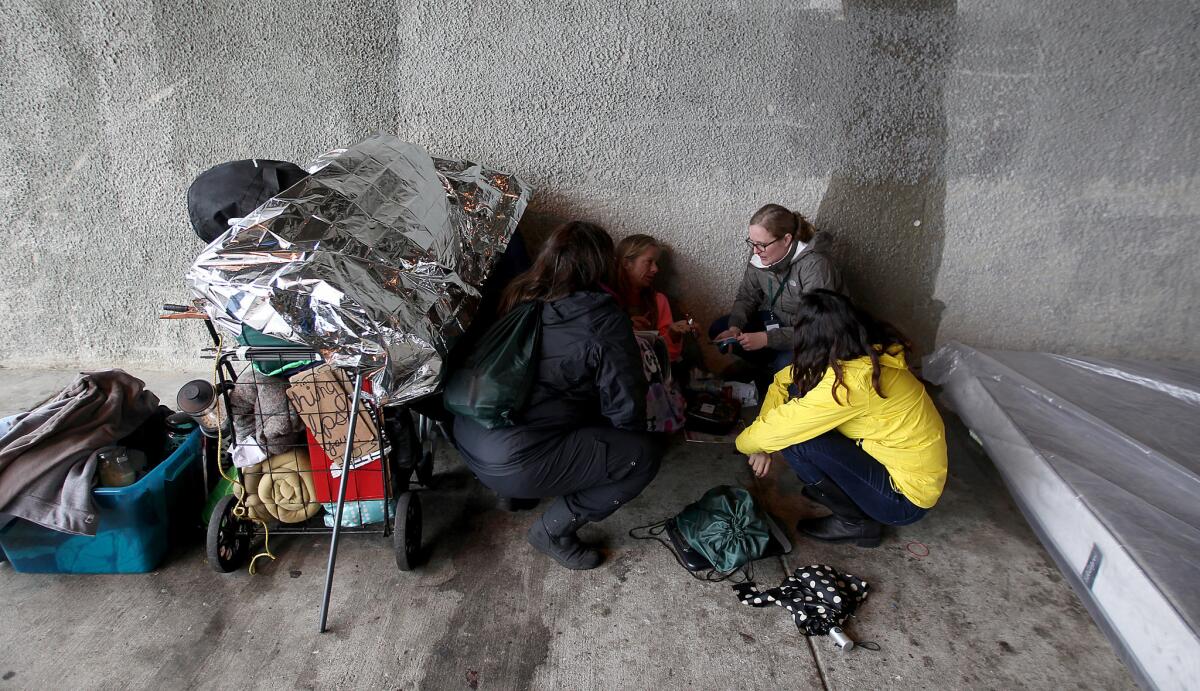L.A. County asks cities to help pay for programs to combat homelessness

Homeless-outreach workers talk to a woman named Sandy as she seeks shelter from the rain beneath the 405 Freeway in Venice earlier this year.
- Share via
Los Angeles County officials are studying how to come up with as much as $500 million a year they say is needed to help address the region’s spiraling homelessness crisis.
They’re hoping that some of it will come from the county’s 88 independent cities, even if it’s only in increments of $500 a month for each homeless person or family in need of a temporary housing subsidy.
Officials made their pitch Thursday at a summit in South Gate where they asked elected leaders and staff from 54 cities to contribute money to a range of county homeless initiatives.
The meeting — where response to the county’s proposals was mixed — came as county officials conduct polling to decide whether to pursue a ballot measure for a tax increase to fund ongoing efforts to combat homelessness.
The options under consideration include a sales tax, a parcel tax, a tax on marijuana sales and a new tax on income over $1 million a year.
According to a county analysis released this week, those could raise between $243 million a year from the income tax and $746 million for a half-cent sales tax, some for countywide services and some to be dispersed to cities.
“Funding isn’t the only key to solving this problem, but it’s a very important element to solving this problem,” said Phil Ansell, the county administrator who has lead the homeless initiative. “Obviously the more cities do, the more successful this whole effort will be.”
Spurred by a 12% increase in homelessness countywide over the last two years, the city and county of Los Angeles passed parallel plans for addressing the problem in February. The county committed to spending $150 million over the next two years.
But the county’s analysis estimated it would take $500 million a year to fill the gaps in needed housing and services, not including the cost of building new housing. Separately, city officials have estimated that $1.85 billion is needed over the next decade to create enough housing to solve the problem.
More than 44,000 people were homeless in Los Angeles County in 2015, according to a count by the Los Angeles Homeless Services Authority.
About half of the county’s population lives in the city of Los Angeles or in unincorporated parts of the county. The other half live in the county’s 87 smaller cities, which have their own authority over land use, and in many cases their own police forces and housing agencies.
Among the other requests to the cities put forward Thursday, county officials asked the city representatives to help pay for residents who participate in a county rapid-rehousing program that gives short-term rent subsidies, employment help and other services to people whose homelessness is not chronic.
The cities were asked to sign up to chip in $500 a month for each homeless family or individual from their jurisdiction served by the program.
And the county is pushing for cities to set aside a significant percentage of their federal low-income housing vouchers to provide housing with supportive services for people who are chronically homeless.
County officials also asked the cities to exercise their land-use authority to help site shelters and affordable housing, and to sign on to a protocol the Los Angeles County Sheriff’s Department is developing that will ask law enforcement not to arrest homeless people for low-level offenses that don’t pose an immediate public safety threat, and instead to connect them with services.
Cities and the county, Ansell said, should “work together to have a coordinated, countywide approach, one that doesn’t focus on moving homeless people from one city to another, but rather focuses on engaging homeless people as effectively as possible to help them move into housing and associated services.”
In part, Los Angeles’ access to federal housing money could hinge on doing that. The U.S. Department of Housing and Urban Development has new standards that penalize regions that are seen as criminalizing the homeless.
The county’s pitch was met with enthusiasm from some city officials, with reticence from others.
South Gate Mayor Jorge Morales said the issue of homelessness is personal to him. His brother ended up on the streets for a time due to drug-addiction issues.
“We’ve done an excellent job of kicking the can down the road, we’ve done an excellent job of working in silos, we’ve done an excellent job of … pushing the issue outside of our borders,” he said. “But it’s really time to come together as one community, as one region and as one county to get to the core of the issue.”
But others raised concerns about decriminalization measures and potential pushback from residents over siting housing or shelters in their jurisdictions or from low-income people who have been waiting for housing vouchers and might be bumped in favor of the chronically homeless.
Santa Clarita Councilman TimBen Boydston said his city has had issues with housing programs in which people have mental health and substance-abuse issues.
“The other needs become a problem and an apparent issue in the neighborhood,” he said.
Twitter: @sewella
More to Read
Sign up for Essential California
The most important California stories and recommendations in your inbox every morning.
You may occasionally receive promotional content from the Los Angeles Times.














